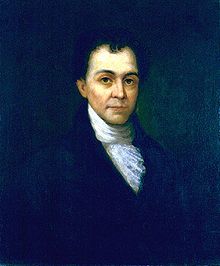Paul Hamilton (politician)
This article includes a list of general references, but it lacks sufficient corresponding inline citations. (February 2012) |
Paul Hamilton | |
|---|---|
 | |
| 3rd United States Secretary of the Navy | |
| In office May 15, 1809 – January 1, 1813 | |
| President | James Madison |
| Preceded by | Robert Smith |
| Succeeded by | William Jones |
| 42nd Governor of South Carolina | |
| In office December 7, 1804 – December 9, 1806 | |
| Lieutenant | Thomas Sumter |
| Preceded by | James Burchill Richardson |
| Succeeded by | Charles Pinckney |
| 1st Finance Comptroller of South Carolina | |
| In office December 21, 1799 – December 7, 1804 | |
| Governor | Edward Rutledge John Drayton James Burchill Richardson |
| Preceded by | Position established |
| Succeeded by | Thomas Lee |
| Personal details | |
| Born | October 16, 1762 Saint Paul's Parish, Hollywood, South Carolina, British America |
| Died | June 30, 1816 (aged 53) Beaufort, South Carolina, U.S. |
| Political party | Democratic-Republican |
| Spouse | Mary Wilkinson |
| Military service | |
| Allegiance | United States of America |
| Branch/service | Continental Army |
| Unit | South Carolina Militia |
| Battles/wars | American Revolutionary War |
Paul Hamilton (October 16, 1762 – June 30, 1816) was the 3rd United States Secretary of the Navy, from 1809 to 1813.
Service in the American War of Independence
[edit]Paul Hamilton was born in Saint Paul's Parish, South Carolina, on October 16, 1762. He left school at the age of sixteen due to financial problems. During the American War of Independence he served in military roles in the Southern United States, fighting under General Francis Marion. He participated with Colonel William Harden in the capture of Fort Balfour.
Political career
[edit]Following the war, he was a planter and public figure. Hamilton served South Carolina in many public offices including state Representative (1787), State Senator (1794), Comptroller (1800), and the 42nd Governor (1804).
In 1809, President James Madison selected Hamilton to become the third Secretary of the Navy. His term in office included the first months of the War of 1812, during which time the small United States Navy achieved several remarkable victories over British warships. Hamilton was a proponent of military preparedness, especially sea fortifications. Although he wanted to strengthen the Navy, he found the Congress hostile and the President indifferent to his ideas. However, he was responsible for the Naval Hospitals Act of 1811. Secretary Hamilton resigned at the end of 1812 and returned to South Carolina, where he died in Beaufort on June 30, 1816.
Legacy
[edit]Three Navy destroyers have been named USS Paul Hamilton in his honor along with USS Hamilton and one Liberty ship named SS Paul Hamilton. Also bearing his name is the town of Hamilton, Georgia.[1]
References
[edit]- ^ Gannett, Henry (1905). The Origin of Certain Place Names in the United States. Govt. Print. Off. pp. 148.
 This article incorporates public domain material from websites or documents of the Naval History and Heritage Command.
This article incorporates public domain material from websites or documents of the Naval History and Heritage Command.
External links
[edit]- SCIway Biography of Paul Hamilton
- NGA Biography of Paul Hamilton
- Paul Hamilton at Find a Grave
- Paul Hamilton Papers at the University of South Carolina Library's Digital Collections Page (letters from 1802 to 1812)
External links
[edit]- 1762 births
- 1816 deaths
- 18th-century American planters
- 19th-century American planters
- 19th-century South Carolina politicians
- Members of the South Carolina House of Representatives
- South Carolina state senators
- Governors of South Carolina
- University of South Carolina trustees
- United States secretaries of the navy
- United States Army personnel of the War of 1812
- Farmers from South Carolina
- South Carolina militiamen in the American Revolution
- American slave owners
- South Carolina Democratic-Republicans
- Madison administration cabinet members
- Democratic-Republican Party state governors of the United States
- South Carolina comptrollers general
- 18th-century members of the South Carolina General Assembly





